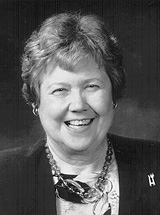September 20, 2004
$200,000 gift from Professor Jean Langenheim establishes graduate fellowship
in plant ecology and evolution
By Tim Stephens
Jean Langenheim, professor emerita of ecology and evolutionary biology, has
been studying plant ecology and evolution for 60 years. Now she is giving financial
support to a new generation of graduate students in her field through an endowed
fellowship fund.

The Jean H. Langenheim Graduate Fellowship in Plant Ecology
and Evolution, funded by Langenheim's gift of $200,000 to the
UCSC Foundation, will be available to graduate students in the
Departments of Ecology and Evolutionary Biology and Environmental
Studies.
Langenheim, an eminent plant ecologist, said the gift had long been part of
her plans for her estate, but she decided to make it now because recent cuts
in state funding and increases in student tuition and fees have made support
for graduate students a critical issue for the campus.
"I wanted to do it now because this is such a critical time for graduate
student funding," Langenheim said.
Because the endowment needs to grow for at least one year to begin generating
funds for fellowships, Langenheim has made an additional gift of $8,650 to ensure
that the fellowship can be awarded to a student for the 2004-05 academic year.
Langenheim's gifts add to a long history of philanthropic contributions from
her to the campus, said Sarah Schuster, assistant director of development for
physical and biological sciences.
"I simply decided to support the field in which I have been doing research
for so long," Langenheim said. "It actually surprised me to look back
and realize that it has been 60 years since I took my first courses in plant
ecology."
Since joining the UCSC faculty in 1966, Langenheim has overseen the work of
41 graduate students as an adviser or coadviser. She said UCSC is a wonderful
place for botanical research. The UCSC Arboretum, the Center for Agroecology
& Sustainable Food Systems, and the Natural Reserve System all offer excellent
resources and opportunities for studying the ecology and evolution of plants.
The campus has a strong tradition of research in the plant sciences by faculty
and students, who have done extensive research not only in California but throughout
the world, especially in the tropics, Langenheim said.
The fellowship is intended to support graduate students with a broad range
of interests within the general area of terrestrial plant ecology and evolution.
How plants adapt to their environment, how they have coevolved with other organisms,
the effects of global warming on plants, and the development of sustainable
management practices for both natural and agricultural ecosystems are among
the many possible areas of study that would be eligible for support.
Langenheim is renowned for her investigations of plant resins and amber. She
wrote the authoritative book on the subject, Plant Resins: Chemistry, Evolution,
Ecology, and Ethnobotany, published by Timber Press in 2003. The book was
recently awarded the 2004 Klinger Book Award from the Society for Economic Botany.
Langenheim has served as the president of the Association for Tropical Biology,
the Ecological Society of America, the International Society of Chemical Ecology,
and the Society for Economic Botany. She also represented UC on the board of
directors for and was academic vice president of the Organization for Tropical
Studies. She has traveled throughout the world in the course of her research,
studying tropical trees as well as redwoods and other Pacific Coast plants.
Langenheim remains active in research and continues to supervise graduate students
at UCSC.
Return to Front Page